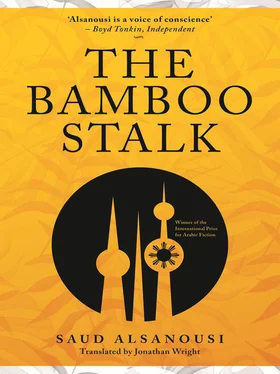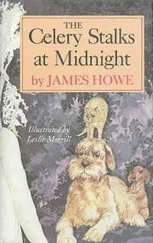‘It’s with the other kitchen stuff,’ her mother groaned. ‘You know where I put it, Pinya!’
But Pinya couldn’t find the spoon with the other utensils and didn’t take the trouble to look for it anywhere else.
‘I can’t find it, Mama,’ she shouted, ‘and I can’t make you congee without it.’
‘Oh, the lazy child,’ her mother sighed, half in despair and half in anger. ‘You haven’t even looked anywhere else,’ she shouted down. ‘I hope you grow a thousand eyes so you can see things,’ she added angrily.
As soon as she uttered the words, the house fell silent. There was no more clattering of plates in the kitchen. ‘Perhaps she’s started cooking,’ said Pinya’s mother, trying to reassure herself.
A long time passed, and all was still in the house. There was no sound of pots and pans in the kitchen, and no smells of cooking from downstairs. The mother grew seriously worried about Pinya. With all the strength she had left, she shouted out, ‘Pinya! Pinya!’ But Pinya didn’t answer.
The neighbours noticed that Pinya’s mother was calling her and crying. ‘Oh! You know how Pinya behaves. Don’t worry. She must be off playing with her friends somewhere,’ said one of the neighbours, trying to reassure her. ‘Perhaps she’s upset you asked her to make congee. She’ll come back soon,’ he added.
Pinya’s mother was comforted by what the neighbour said but the feeling didn’t last long. She struggled out of bed to look for Pinya in the village and ask people if they had seen her, but there was no trace of the girl. Her mother was exhausted. She cried and sobbed, but Pinya still couldn’t be found.
One sunny day, as Pinya’s mother was sweeping the backyard, she spotted a strange and unfamiliar fruit, about the size of a small child’s head and with thick green leaves sprouting from the top. Surprised, she went up to it and ran her fingers over the outside of the fruit. ‘It feels strange. It has a thousand eyes,’ she said. Then she repeated that last sentence to herself and suddenly remembered the wish she had made for her daughter.
Pinya’s mother was convinced that Pinya had turned into the fruit and now had a thousand eyes, as she had wished, but none of the eyes could see or shed tears.
Because Pinya’s mother still loved her more than anything else in the world, she tended the fruit and, faithful to Pinya’s memory, made a vow to collect the seeds of the strange fruit and replant them. The plants multiplied in her backyard and she started giving some of them to her neighbours and to the other villagers, who called them piña, pineapple, after the unfortunate girl.
This myth no longer frightened me, even when Mendoza kept saying, within earshot of me, that he wished I would grow a thousand eyes. But even so, ever since I heard the legend, I haven’t been able to eat pineapple.
Something inside me tells me a pineapple was once a person, Pinya the little Filipina girl.
20
In 2004 Maria appeared in our lives. She was Merla’s closest friend, and now I had an explanation for the tattoo with which Merla had adorned, or disfigured, her silky arm: MM .
Maria was a weird girl. I had heard her name from Merla for some time but I had never seen her till then. When she started visiting us at home, no one in the family warmed to her. She visited often and spent plenty of time with Merla in her room. Mama Aida didn’t hide her feelings towards Maria: she received her with a frown, and this caused many problems between Mama Aida and Merla. Mama Aida warned Merla about Maria all the time and told her frankly that she wasn’t comfortable about her. There were repeated arguments. Merla did what she wanted. The day would end with Mama Aida crying in bed before going to sleep.
I didn’t have any hostile feelings towards Maria because of what Mama Aida thought. Despite her strange appearance — the little hairs that showed on her temples, her short hair, her loose clothes and her way of walking, which was inappropriate for a girl — the reason I didn’t take a liking to her was that she had imposed her will on my cousin.
Merla kept her distance from me and we had absolutely nothing in common any more. We no longer spent the evenings together in my room or went on trips to faraway places. Nothing that made my relationship with Merla special was left after Maria got hold of her. Merla wasn’t even satisfied with the time she spent with her weird friend outside or at home; she installed a phone line in her room so they could chat all night.
Although I was attached to Mama Aida and loved her, and she looked after me, our house was no longer what it had been once Merla started staying out till the early hours. She chatted with Maria on the phone, woke up late and spent the rest of the day outside with her friend.
Every day, when I was working with Grandfather, I would see Merla heading to the sandy lane at the end of Mendoza’s land, jumping on the back of Maria’s motorcycle and wrapping her arms around Maria’s waist. Then they would set off for an unknown destination.
In my dreams Merla was mine, but in real life she was Maria’s.
But I couldn’t get Merla out of my heart. Religion didn’t stop me wanting to have her and her preference for her own gender didn’t stop me thinking about her in my sleep and in my daydreams.
* * *
One time that year I woke up in the middle of the night. Mama Aida was shouting and pounding on one of the doors upstairs. I was still in bed.
‘Keep quiet! Keep quiet, you whores!’ Mendoza shouted through his window nearby. ‘Get up, you son of a whore, and go and see what’s happening upstairs,’ he added, speaking to me.
‘You get up and go see, if you dare,’ I muttered to myself.
On the upper floor Mama Aida was kicking the door of Merla’s room and pounding on it with her fists like a madwoman.
‘What’s happening, Mama?’ I asked, pushing her back from the door.
‘Can’t you smell it? That girl is crazy,’ she said.
I could smell cigarette smoke from Merla’s room.
‘What’s new about that, Mama? You know Merla smokes,’ I said.
She pushed me away and attacked the door again, pounding on it hysterically. ‘That’s not cigarettes,’ she said.
She kicked the door with her foot. ‘Open the door or else!’
‘Merla’s smoking marijuana,’ she added, turning to face me.
Mama Aida, so assertive upstairs, was weaker than I had ever seen her once we were in the sitting room downstairs.
As Maria started up her motorcycle, breaking the silence of the night outside, Mama Aida was sobbing inside. She took her daughter’s hands and kissed them.
‘Please, I beg you, don’t go,’ she said.
Merla looked away, towards the front door, and picked up her bag of clothes.
‘Merla, I beg you. Merla, don’t do it.’
Mama Aida locked the door and stood leaning back against it.
‘Get out of the way, Aida,’ Merla said. ‘Your begging won’t do any good.’
Mama Aida slumped to the ground, her energy spent, her back still against the door. ‘This isn’t the life I want for you, Merla, please.’ She covered her face with her hands and sobbed. ‘I want you to have a real life. A house, a husband and children.’
‘That’s enough!’ shouted Merla. ‘You said a husband and children!’
I cried because Mama Aida was crying, while Merla went out shouting: ‘After everything you’ve said about men you want me to have a husband and children!’ But suddenly Merla’s voice cracked. ‘Look at me,’ she said. ‘Look what’s happened to me! Where’s my father?’
She burst out crying and, trying to fight back her sobs, she continued, ‘Look at yourself. At your drunken father in his house. Look what’s happened to him. Look what’s happened to yourself.’
Читать дальше












